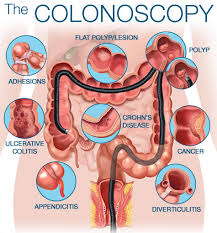 If you’re a regular reader of Talking About Men’s Health, you know that there’s been a lot of controversy lately about whether or not two common screening tests—mammograms for women and PSA for men—actually improve survival rates or slow down the profession of early-stage cancers. (Despite the controversy, we believe that in both cases, the decision about whether the screening test should be done is best made by the individual patient and his or her healthcare provider). But there is one screening test that just about everyone agrees is a success on all counts: colonoscopy.
If you’re a regular reader of Talking About Men’s Health, you know that there’s been a lot of controversy lately about whether or not two common screening tests—mammograms for women and PSA for men—actually improve survival rates or slow down the profession of early-stage cancers. (Despite the controversy, we believe that in both cases, the decision about whether the screening test should be done is best made by the individual patient and his or her healthcare provider). But there is one screening test that just about everyone agrees is a success on all counts: colonoscopy.
In a study just published in the journal JAMA Surgery, researcher Ramzi Amri and his colleagues tracked more than 1,000 patients who had colon cancer surgery between January 1, 2004 and December 31, 2011. They then divided those patients into two groups: those whose colon cancer had been diagnosed via a colonoscopy, and those who had been diagnosed using other means.
The results were pretty amazing. Patients whose cancer had been diagnosed without a colonoscopy were twice as likely to have an invasive tumor that had spread to the lymph nodes, had three times the risk that the cancer had already spread before they were diagnosed, were three times more likely to die from the cancer, had double the risk of having the cancer recur, and overall had shorter post-surgery survival times. You can read an abstract of the study here.
One of the great benefits of colonoscopy is that the doctor doing the procedure can safely remove precancerous polyps as well as cancerous lesions. In both cases, that may keep the cancer from spreading or getting worse.
Colon cancer is the second leading cause of cancer-related death in the United States. According to the American Cancer Society, 100,000 people in the U.S. will be diagnosed with colon cancer for the first time, and more than 50,000 will die of the disease. Generally speaking, men should begin getting screened for colorectal cancer starting at about age 50. Of course, if you’re in a high-risk group, you may need to be screened earlier. Make sure you talk with your healthcare provider about the screening schedule that’s right for you.
The procedure itself is relatively painless—you’re under sedation and are awake but barely aware of what’s happening. For some people, though, the idea of having a 5-foot long tube inserted into their rectum is so off-putting that they avoid the procedure entirely. Big mistake. Unpleasant images aside, a colonoscopy can be a life-saving procedure. So, to quote Nike, “Just do it.”



